Unit2WhatshouldIdo?教案教学设计(新目标版英语八年级)
八年级英语:Unit2WhatshouldIdo教案

初中英语新课程标准教材英语教课方案( 2019—2020学年度第二学期)学校:年级:任课教师:英语教课方案 /初中英语/八年级英语教课方案编订: XX文讯教育机构Unit 2 What should I do教课方案教材介 : 本教材主要用途通学英的内容,提升学生的言技术,增添一言能力,有益于国化的平时沟通、生活、工作等,本教课料合用于初中八年英科目 , 学后学生能获得全面的展和提升。
本内容是依据教材的内容行的写,能够放心改正整或直接行教课使用。
unit 2 what should i do?教课方案元教课目与要求安排5① 在学校和家庭中碰到的各种麻和;② 别人找到合理的解决法, 提出相的建;③ 自己的找到解决法。
period 1 section a(1a—2)teaching aims1. knowledge aims① key vocabularies:play cds, argue with sb, too loud out of style, what ’s wrong? surprise, ticket.② key sentences: what’s the matter with⋯? / what’ s wrong⋯ ? /what should i/ he / they do? you could / should /⋯you’ d better⋯ why not⋯2. ability aimsto train students’ ability of judgment.to have ss give adviceto improve students’ ability of listening and speaking.3. emotion aimsto teach them to understand others.to teach them to help others when they are in trouble. important difficult pointsto know about others’ troubleto use different sentences to give some adviceteaching aidstape recorderteaching steps( 一) step 1. lead-ingreet with ssask some of them:are you happy today? why?is the icy happy today?what’s the matter with him?is it serious?what should he do?由what’ s the matter with⋯? what should he do?两个学生熟习的句式入新,学生有可,也下文作。
英语:Unit2WhatshouldIdo英文教案(人教新目标八年级下)
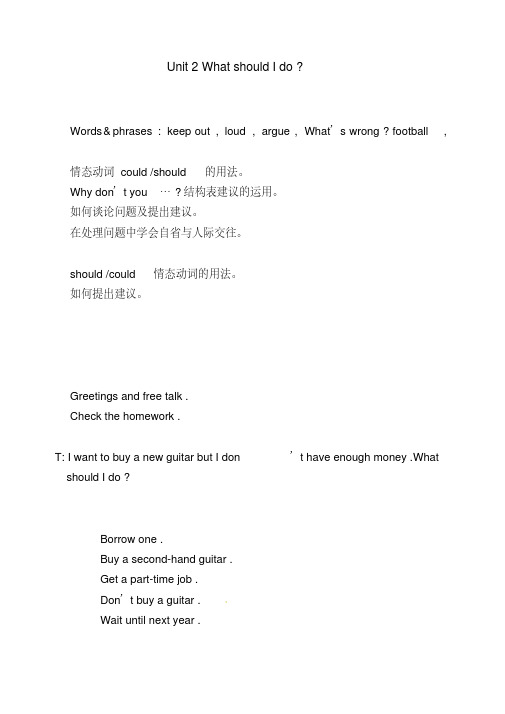
Unit 2 What should I do ?Words & phrases : keep out , loud , argue , What’s wrong ? football ,情态动词could /should 的用法。
Why don’t you … ?结构表建议的运用。
如何谈论问题及提出建议。
在处理问题中学会自省与人际交往。
should /could 情态动词的用法。
如何提出建议。
Greetings and free talk .Check the homework .T: I want to buy a new guitar but I don’t have enough money .What should I do ?Borrow one .Buy a second-hand guitar .Get a part-time job .Don’t buy a guitar .Wait until next year .dvice –to tell people what we think they should do .Read the instructions to the Ss .Read the problems by the Ss .Ask Ss to write the problems in the “Serious” or “Not serious”Explain .Talk about the answers with the class .Practice reading ..Play t he tape a third time .Check the answers .Read t he instructions .Make sure the Ss understand what should theyPoint to the sentences below .Play the tape the first time .Ss only listen .Pay attention toPlay the tape again .Ss circle “could” or “should” .Correct the answers .hould .Go over the words .My clothes are out of style ,what should I do ? Please give t heGreeting and free talk .Check the homework .Collect the students’ advice .Write it downReview the differences between “could /should” .Learn the new words in Page 12 .Read the instructions .Read t he conversations by Ss or listen to the tape .Then write “goodTalk about the students’ answer s .Make sure the students understand the dialogue.Practice readingRead the instructions .Point out the example conversation and askUse your head .Find some other ways to get money that aren’t inAsk Ss to work with partner as they ask for and give advice .Pairwork .Act out the conversations to the class .Read t he instructions .Make sure the Ss understand what they shouldTo students read the dialogue .Practice reading .Ask another pair to give their advice on another topic .Pairwork .Greetings and free talk .Check the homework .Read the instructions to the students .Read the sentences and ask a student to read the sentences to theWrite NI , I , VI for each statement .“What is important to you when you choose clothes ?”Write one orRead t he instructions .Make sure the Ss understand what they shouldRead t he three sentences in the box .You will be listening to a radioPlay the tape twice .Ss check the problem they hear .Play the tape again ,Ss correct the answers .Read t he instructions .Make sure Ss understand what they should pay Look at the chart .There are three persons ,Kim , Nicole ,Play the recording again .Ss write their answers .Play the recording again ,one sentence by one sentence .Check thePoint out the example in the sample dialogue .Ss practice reading . Pairwork: What do you think Erin should do ?Share their conversations with whole class .Greetings & free talk .Check the homework :I left my homework at home ,what should I do ?Scan this letter ,underline the problem .Read the letter again , tick out the new words .Explain something :Pairwork: Give some advice to the lonely kid in 3a .Suppose you’re Mary .Write the letters on your own .Read the letters to the class .Read the problem in the box .Two students read the dialogue .[来源:学#科#网]Pairwork : Think them over and give your advice .Groupwork: See which classmate has the b est advice .Fill in the blanks with the words given .Try to make your ownRead the letter to Aunt Chen’s advice column and then write someGreetings and free-talk .Check the homework :Read the letter out in the class ,the other SsWhat after-school activities can you think of .Write what you doSB Page 16 , 1b .Read the words and guess the meaning .if there areRead the passage quickly and get the main idea .Listen to the recording .Circle the words in the box in 1b .Explain something :Read these statements .Pairwork: Number each pair 1-5 around the class .Ask each pair toAfter a while .All pairs with the same number from a group andAfter five minutes .Each group report their ideas to the class . Write four sentences using one of the words from 1b in eachAre you or your friends under pressure ? Do a survey to find out .。
人教新目标英语八下Unit2WhatshouldIdo教案17

Unit2 What should I do ?导学案一、Learning goals (目标)Knowledge goals :possible , find it + adj. + to do sth.Grasp ( 掌握) :It’s time for…,as…asAbility Goal :Grasp some reading strategies and improve reading ability.( 掌握一些阅读技巧,提高阅读能力)Emotional goals :Parents should give their kids a bit more time to themselves and learn to relax(家长应该给孩子更多的空闲时间,让他们学会放松)二、Important and difficult language points (重难点)possible , find it + adj. + to do sth.1.The use of It’s time for…,as…as2.Grasp some useful expressions三、Teaching procedure(教学过程)Step 1 Greeting (问候)Step 2 Before you read.(读前)1. Show some pictures and talk about what problems do they have .()2. Divide them into 5 groups.Step3 While you read.(读中)Show the reading skills。
(展示读的技能)1.Read fast and answer the questions.(速读以求理解)three children ?1).What’s the life like for Cathy Taylor’s2). Are many children under pressure?3).What should the parents do?2.Read again (再读)1) Find the main ideas of each passage.(找出段意)Paragraph 1 a. Most children take part in after-school clubs.Paragraph 2 b. Linda Miller’s opinion about children’s pressureParagraph 3 c. Life for Cathy Taylor’s three children is very busy.Paragraph 4 d. Alice Green’s opinion about children’s pressure.Paragraph 5 e. The Taylors take their kids from activity to activity.2)Choose the right answer.(选择)Many children are____. After school, they have to take part in ____ .Then they ____ and have to do their homework. Their parents try to fit ____ into their kids’ crazy.lives. It’sthemselves.People shouldn’t_____ . Parents should learn to give their kids ____ toA.push their kids so hardB. under too much pressureC. all kinds of classesD. a bit more timeE. have a quick supperF. as much as possible3.Read carefully and solve problems(细读解决疑难)<T or F>(判断正误并改正)1).Cathy Taylor’s children do many after- school activities.2).Doctors say many children aren’t under too much pressure.3). Few children take part in after school activities.4).Parents don’t think their children should do the same as others.5).It’s crazy for parents to compare their children with others.6).Competition between families starts at a young age.<Finish the chart> (完成表格)The Taylors take their children _____activity____ activity, and try to ____ ___much as ______ ____their kids lives.Doctors say many children are _____ ______ ______ ________.Teachers ________ ________ teaching ______ kids in the classroom.<Find out the language points> (找出语言点)In America, most children are very busy. Every day they don’t get home until 7 pm. After supper, it’s time for homework. Parents always compare their kids with others. In some families, competition starts from a very young age. Teachers complain about teaching tired kids in the classroom.<Find out the same point.> (找出共同点)1. These children may find it hard to think for themselves when they are older.2. They might find it difficult to plan things for themselves.Step4 After you read (读后)1.Read these statements. Is the situation the same in China?(读下列句子,讨论是否与中国一样)( )American and British children do many after-school activities.( ) Many children are under pressure.( ) Parents these days push their children much harder than before.( ) Competition between families starts at a young age.( ) Children should have free time to relax.3.Do a survey in groups and then report.(小组调查)When do you feel under pressure? What should you do to relax?Write a letter to your headteacher about relax(给校长写封信)Dear headteacher,________________________________________________________________________________________________________________________________________ Yours_____Step5 Summary:What have we learned from the text? (从课文中学到了什么?)Step6.Homework: 1.Please write a letter to Cathy Taylor. Give her advice about what she should do with her children.(P17 3c)2.Read the reading text more carefully, try to understand all the important points当堂检测单项选择1Parents try ____ their kids’ lives.A. planB. to planC. planningD. planned2. They are always compare their kids ____ others.A. toB. withC. forD. from3. ____ are having breakfast.A. The KingB. KingsC. The KingsD. The King family句型转换1. I think you should clean your room first.(改为否定句)I _____ think you _____ clean your room first.2. He went back home after he cleaned the classroom yesterday. (改为同义句)He ____ ____ home _____ he cleaned the classroom yesterday.3. I found it difficult to get on well with my new classmates. (改为同义句)It ____ difficult ____ ____ to get on well with my new classmates.汉译英1.我们该上课了。
八年级英语WhatshouldIdo教案
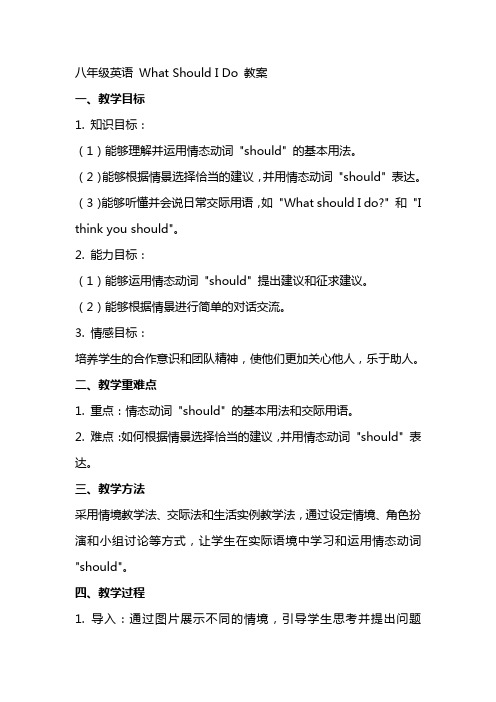
八年级英语What Should I Do 教案一、教学目标1. 知识目标:(1)能够理解并运用情态动词"should" 的基本用法。
(2)能够根据情景选择恰当的建议,并用情态动词"should" 表达。
(3)能够听懂并会说日常交际用语,如"What should I do?" 和"I think you should"。
2. 能力目标:(1)能够运用情态动词"should" 提出建议和征求建议。
(2)能够根据情景进行简单的对话交流。
3. 情感目标:培养学生的合作意识和团队精神,使他们更加关心他人,乐于助人。
二、教学重难点1. 重点:情态动词"should" 的基本用法和交际用语。
2. 难点:如何根据情景选择恰当的建议,并用情态动词"should" 表达。
三、教学方法采用情境教学法、交际法和生活实例教学法,通过设定情境、角色扮演和小组讨论等方式,让学生在实际语境中学习和运用情态动词"should"。
四、教学过程1. 导入:通过图片展示不同的情境,引导学生思考并提出问题"What should I do?"。
2. 新课内容:讲解情态动词"should" 的基本用法,如提出建议、征求建议等。
3. 实例展示:展示日常生活场景,让学生听懂并学会使用"What should I do?" 和"I think you should" 进行交流。
4. 小组讨论:学生分组讨论,根据给定的情境选择恰当的建议,并用情态动词"should" 表达。
5. 角色扮演:学生分组进行角色扮演,模拟实际场景,运用情态动词"should" 进行对话交流。
初中八年级英语 Unit2 What should I do教案(人教新目标八年级)
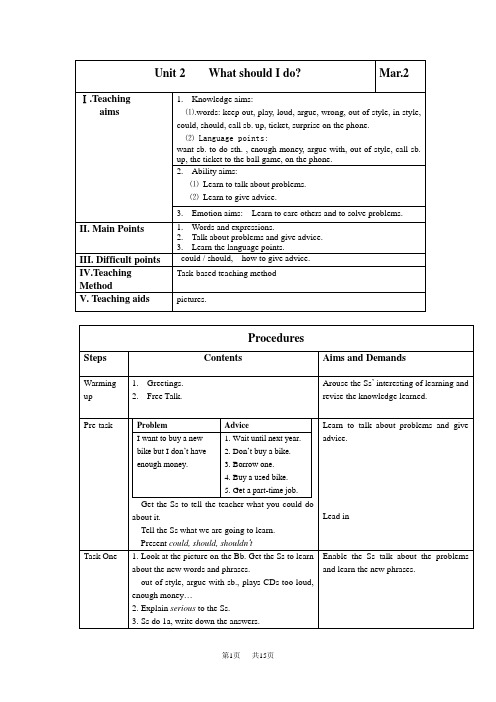
want sb. to do sth. , enough money, argue with, out of style, call sb. up, the ticket to the ball game, on the phone.
2.Ability aims:
Learn to talk about problems.
Notes of this period
Contents on the Bb
1.keep out
2.want sb to do sth
3.enough money, old enough…, enough to…
4.argue with, agree with , help with…
5.out of style, in style
3. Ask the Ss to work with their partners as they ask for and give advice.
4. Ask some pairs of Ss to say their conversations to the class.
Enable the Ss practice oral English using the target language
. Difficult points
pay for, either, What shouldIdo? Maybe you should/could…
.Teaching Method
Task-based teaching method
. Teaching aids
pictures, radios
Aims and Demands
新目标英语八级下教案UnitWhatshouldIdo

新目标英语八年级下教案Unit 2 What should I do?一、教案目标1谈论在在学校和家庭中遇到的种种麻烦和问题。
2为他人找到合理的解决办法,提出相应的建议。
3为自己的问题找到解决办法。
二、教案向导1语言功能:谈论遇到的问题;提出建议。
2 语言目标:My brother plays his CD too loud. What should I do? Why don 'you talk to him about it? 3语言结构:情态动词could, should的用法。
Why don 'you…?结构。
4 重点词汇:loud, agree, original, out of style, talk on the phone, advice, ask for, call up, pay for, eno ugh, talk about.The first period1 Review the words of un it 1.2 Review the simple future ten se.Step 2 Prese ntati onMake a two---column chart on the board with the heading problem at the top of column 1 and the headi ng advice at the top of colu mn 2, write only the words that describe the advice and don 'use the words could, should and shouldn 'for moment. For example:2 Using the words could, should and shouldn 'to describle the advice. For example:You could wait un til n ext year.You should n 'buy a guitar.You could borrow one.Say, in this un it, we are going to talk about problems. People have and lear n how to give these people advice.Step 3 Activity 1a1 Give two minutes to the students to write the problems in the serious on not serious columns.2 Talk about the an swers with the class. Ask, who put my pare nts want me to stay at home every night ”n the serious column? Ask the same questions about the other items.3 Read the sentences after me.Step 4 Liste ningListen and circle the problem you hear in activity 1a.Step 5 Work in pairs1Look at the problems in activity 1a and make conversations.2 Give three minutes to the students to work in pairs.3 Ask a few pairs of students to present their conversations to the class.Step 6 Listening1 Listen to the tape and finish activities 2a and 2b, then check the answers.2 Then read the tape scripts after me.Step 7 PracticeRole play the conversation between Peter and his friend. For example: A: What is the matter, Peter? B: I had an argument with my best friend. What should I do?A: Well, you could write him a letter.Step 8 SummaryIn this unit, we are going to talk about problems people have and use the words could, should and shouldn 'tto describle the advice. Give some examples.Step 9 Homework1 Copy the words of this lesson.2 Review the contents of this lesson.The second periodStep 1 Revision1 Review the words of last lesson.2 Review the uses of the words: could, should and shouldn 't.Step 2 Activity 3a1 Write the three possible responses on the Bb and ask a student to read the responses to the class.2 Ask four students to read the conversation to the class.3 Explain some important and difficult points.4 Give two students to the students to label each piece of advice as either good idea, OK, idea or bad idea.5 Talk about the students 'answers.Step 3 Work in pairs1 Point to the example conversation in activity 3b and ask two students to read it to the class.2 Ask students for some ways to get money that aren 'tin the book.3 Ask students to work with partners as they ask for and give advice.4 Ask two or three pairs of students to present their conversations to the class.Step 4 Practice1 Point to the example conversation in activity 4 and ask two students to read it to the class.2 Ask two students to read the dialogue.3 Ask another pair of students to give their advice on another topic.4 Ask students complete the work in pairs.5 Ask a few students to list their advice. Write a list of the best advice on the Bb.The third periodStep 1 revision1 Review the words and the contents of last lesson.2 Ask individual student to learn the dialogue on activity 3a by heart.Step 2 PresentationSay: when you choose clothes, what is important to you? Help the students answer: they are comfortable/ i n style/ i n expe nsive/ colorful/ origi nal …the n teach the new words.Step 3 Activity 1a1 Point to the sentences and ask a student to read them to the class.2 Ask the students to write NI or VI.3 Talk about the answers with the class.Step 4 Work in pairs1 Work with a partner. Make your own statements about the items in activity 1a.2 Ask a few students to say one or more of their statements to the class.Step 5 Listening1 Listen to the tape( twice) and finish the activities 2a and 2b.2 Listen again and repeat the tape scripts.3 Read the tapescripts after me.Step 6 Work in pairs1 Work with a partner. Say what you think Erin should do.(looking at activity 2c).2 After several minutes, ask a few pairs of students to say part of their conversation to the class. Step 7 Homework1 Do some exercises on the small Bb.2 Review the words and the contents of this lesson.The fourth periodStep 1 Revision1 Check the homework.2 Review the words “could, should and shouldn 't”.Step 2 New lessonLook at activity 3a1 Have students read the letter and tell me. What words or phrases they don 'tunderstand and I write these words or phrases on the Bb. At last I teach the students the new words.2 Give two minutes to the students to underline the problem.3 Read the letter and explain the important and difficult points.4 Read the letter after me.Step 3 Writing1 Think of some advice for “lonely kid ”2 Ask students to write the letters on their own.3 Ask some students to read their letters to the class.Step 4 Work in groups1 Look at activity 4 , ask three students to read the dialogue.2 Ask a group of students to give their advice for one of the problems. For example:A :I left my homework at home. I have to hand it in today. What should I do?B: You should ask the teacher to forgive you for handing it in tomorrow morning.C: You should explain it to your teacher.3 Ask students to complete the work in groups.4 Ask a few students to present their conversations to the class.Step 5 Workbook ( self check)Do Exercise 1, give five minutes to the students to fill in the blanks on their own. Then check the answers.2 Ask several students to make their own sentences with the words and write a number ofstudents'answers for each word on the Bb.Step 6 HomeworkCopy the words and the letter in activity 3a in the exercise books.The sixth periodReview the words of last lesson.Step 2 Writing some advice1 Read the letter at P15 and give some advice. At first, ask the students to find the words that they don't understand. Then write the new words on the Bb. At last, teach the new words.2 Ask students to complete the advice on their own.3 Ask a few students to read their letter of advice.Step 3 ReadingRead the text at P16.1 Give five minutes to the students to read the text. And find the words that they don 't understand .then teach the new words.2 Read the text and explain some important and difficult points.3 Listen to the tape and repeat. Then read it after me.Step 4 Do some exercises1 Write four sentences using one of the words from activity 1b in each sentences.2 After five minutes. Ask individual student to read their writing.Step 5 Homework1 Write a letter to Cathy Taylor. Give advice about what she should do with her children.2 Be ready for a text.If there is time, do some exercises on the small Bb.1 I don't like _____ (write) letters.2 I __ (argue) with my brother yesterday morning.3 My parents want me __ (stay) at home every day.4 My friends has _ (nice) clothes than I do.5 Could you please give me some___(advice) on how to learn English?6 Jim could not join the club, as he was too___(shyly).。
八年级英语下册《unit2WhatshouldIdo》教案2人教新目标版

省滨州市邹平实验中学八年级英语下册《unit2 What should Ido》教案2 人教新目标版Teaching goals:1 Words& phrases: pay for part-time job, either, bake sale , tutorOriginal the same as in style haircut2. What should I do ? borrow ….from……, he doesn’t have , either.You could do………. . has the same haircut as I do .Teaching procedures:Step 1 Leading in1. check the homework .2 learn the new words.Pay for ---spend , cost ,take part-time job –full-time job , eith er---too alsoThe same as ---different from, in style—out of style3 read and write one by one / together / in groups /4 check the writing and the reading of the new wordsStep 2 3a 3bRead and choose the right suggestions.Learn to give others some advice.Good idea okay i dea bad ideaRead and choose , then pay attention to the following languages.1 get some money to pay for summer camp2 You coul d borrow some money from your brother.3 He doesn’t have any mone y ,either.4 I think you should ask your parents for some money.Read 3b and practice in pairs.Attention: That is a good idea.Step 3 1a---2cOral practice when you choose clothes, what is important to you?Choose it by yourself.Attention : They are the same as my friends` clothes.expensive ---in expensiveListening practice2a listen and check Erin`s problem.2b listen and fill in the chart, pay attention to the adviceListen carefully and check the answers.2c pair workTell sb to do sth.Step 4 Practice1.我需要一些钱去参加夏令营。
八年级英语下册+Unit2+what+should+I+do教学设计+
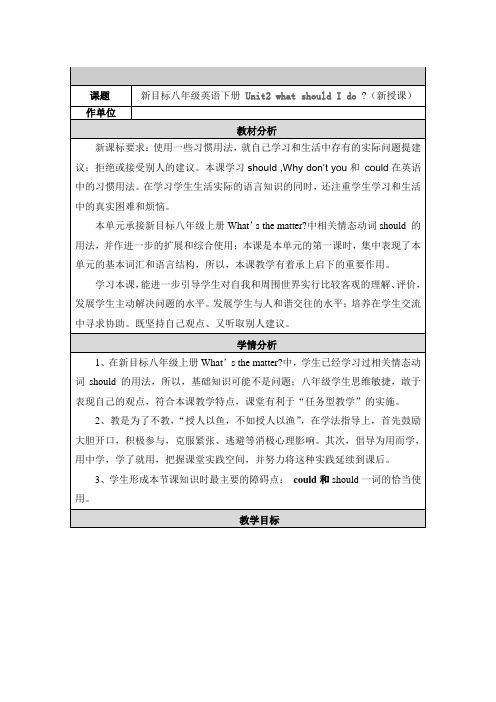
利用课余时间展开调查,理解社会中存有的一些问题,然后尝试写一篇短文,针对这些问题,提出可行方法和建议。
板书设计(需要一直留在黑板上主板书)
Unit 2 What should I do?
1.want sb to do sth2. enough +n; adj/adv+ enough
3、情感目标:
通过共同探讨、解决各种烦恼和困惑,学会反思自己,体谅他人,树立合作精神,培养积极乐观的情感态度。
教学重点和难点
本课的教学重点:学会使用情态动词should、could。
难点:能够使用所学谈论问题和困难,选择或提出建议。
教学过程
教学环节
教师活动
预设学生行为
设计意图
1.Play games
课题
新目标八年级英语下册Unit2 what should I do?(新授课)
作单位
教材分析
新课标要求:使用一些习惯用法,就自己学习和生活中存有的实际问题提建议;拒绝或接受别人的建议。本课学习should ,Why don’t you和could在英语中的习惯用法。在学习学生生活实际的语言知识的同时,还注重学生学习和生活中的真实困难和烦恼。
Listen carefuiiy and do the
exercise( Fill in the blankets of the dialogue )
激发学生的学习兴趣,活跃课堂气氛,导出本课中心话题。
设计情景,引人入胜,使知识由浅入深,由易到难,层层展开,另外,通过图画也对学生实行了思想教育,使他们学会反思自己,体谅父母。
在这种开放、和谐、互动的任务型语言气氛中,能够调动学生的参与热情,感受语言魅力,体验知识的实用性,培养了学生的合作精神和自省水平。
八年级英语WhatshouldIdo教案

八年级英语What Should I Do 教案一、教学目标1. 知识目标:(1)能够理解并运用情态动词should 的基本用法。
(2)能够根据情境,使用情态动词should 提出建议和做出决定。
(3)能够听懂、会说、会写本课的生词和重点句子。
2. 能力目标:(1)能够用英语进行简单的日常咨询和回答。
(2)能够根据情境,用英语提出建议和做出决定。
3. 情感目标:(1)培养学生积极帮助他人的精神。
(2)培养学生善于倾听和理解他人的能力。
二、教学重点与难点1. 教学重点:(1)情态动词should 的基本用法。
(2)如何根据情境,使用情态动词should 提出建议和做出决定。
(3)本课生词和重点句子的掌握。
2. 教学难点:(1)情态动词should 的辨析。
(2)如何根据情境,灵活运用情态动词should。
三、教学方法1. 情境教学法:通过设定各种情境,让学生在实际语境中学习和运用语言。
2. 交际法:通过师生互动、生生互动,培养学生的口语表达能力。
3. 任务型教学法:通过完成各种任务,提高学生的综合语言运用能力。
四、课前准备1. 教师准备:教材、课件、录音机、磁带、情景卡片等。
2. 学生准备:预习课文,准备进行课堂互动。
五、教学过程1. 导入:(1)师生问候,回顾上一课内容。
(2)引导学生谈论日常生活中遇到的困难或问题。
2. 新课呈现:(1)展示课件,引入主题。
(2)讲解情态动词should 的基本用法。
(3)引导学生进行情景对话,实践运用should。
3. 课堂活动:(1)分组进行角色扮演,模拟情景对话。
(2)学生展示,互相评价。
4. 巩固练习:(1)完成课本练习题。
(2)小组竞赛,看哪组完成得最快最准确。
(2)布置作业:抄写生词,预习下一课。
六、教学反思本节课结束后,教师应认真反思教学效果,包括学生的学习态度、参与度、语言运用能力等方面。
针对教学过程中出现的问题,及时调整教学策略,以提高教学效果。
人教新目标英语八下Unit2WhatshouldIdo教案13
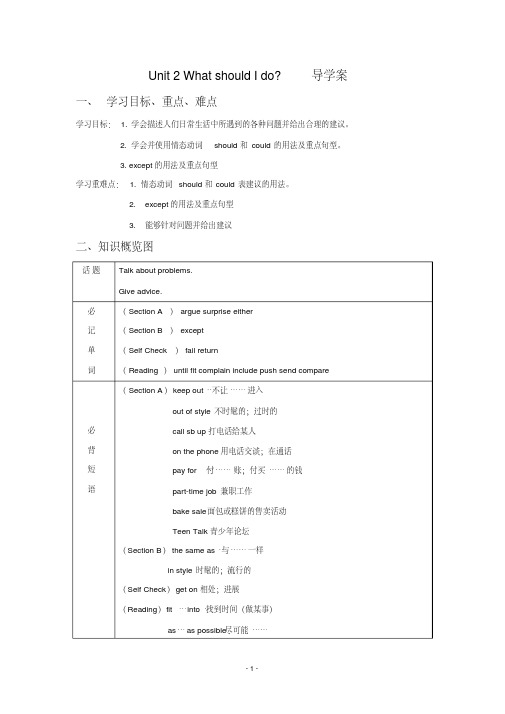
Unit 2 What should I do?导学案一、学习目标、重点、难点学习目标: 1. 学会描述人们日常生活中所遇到的各种问题并给出合理的建议。
2. 学会并使用情态动词should和could的用法及重点句型。
3. except的用法及重点句型学习重难点: 1. 情态动词should和could表建议的用法。
2. except的用法及重点句型3. 能够针对问题并给出建议二、知识概览图话题Talk about problems.Give advice.必记单词(Section A)argue surprise either(Section B)except(Self Check)fail return(Reading)until fit complain include push send compare必背短语(Section A)keep out…不让……进入out of style不时髦的;过时的call sb up打电话给某人on the phone用电话交谈;在通话pay for…付……账;付买……的钱part-time job兼职工作bake sale面包或糕饼的售卖活动Teen Talk青少年论坛(Section B)the same as…与……一样in style时髦的;流行的(Self Check)get on相处;进展(Reading)fit…into…找到时间(做某事)as…as possible尽可能…… all kinds of 各种各样的on the one hand(在)一方面on the other hand在另一方面日常用语My brother plays his CDs too loud. What should I do?我哥哥播放CD的声音太大了。
我该怎么办?You should say you’re sorry.你应该说对不起。
You could write him a letter.你可以给他写一封信。
八年级英语WhatshouldIdo教案
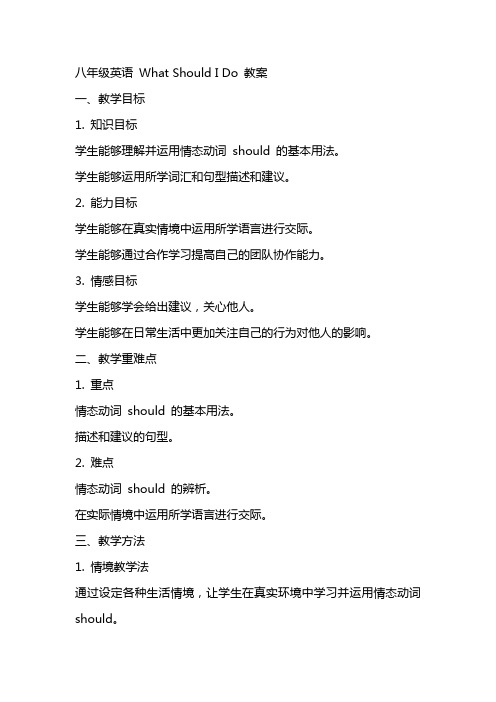
八年级英语What Should I Do 教案一、教学目标1. 知识目标学生能够理解并运用情态动词should 的基本用法。
学生能够运用所学词汇和句型描述和建议。
2. 能力目标学生能够在真实情境中运用所学语言进行交际。
学生能够通过合作学习提高自己的团队协作能力。
3. 情感目标学生能够学会给出建议,关心他人。
学生能够在日常生活中更加关注自己的行为对他人的影响。
二、教学重难点1. 重点情态动词should 的基本用法。
描述和建议的句型。
2. 难点情态动词should 的辨析。
在实际情境中运用所学语言进行交际。
三、教学方法1. 情境教学法通过设定各种生活情境,让学生在真实环境中学习并运用情态动词should。
2. 交际法通过角色扮演、小组讨论等形式,让学生在实际交流中提高自己的语言运用能力。
3. 任务型教学法通过完成各种任务,让学生在实践中掌握描述和建议的句型。
四、课前准备1. 教师准备相关情境的图片和场景。
2. 学生准备笔记本和笔,以便记录和学习。
五、教学过程1. 导入(5分钟)教师通过提问方式引导学生复习已知的情态动词。
学生回答问题,回顾情态动词的基本用法。
2. 新课呈现(15分钟)教师展示各种生活情境的图片,引导学生用情态动词should 进行描述。
学生跟读并模仿,学习情态动词should 的用法。
3. 课堂练习(15分钟)学生分成小组,根据教师提供的情境,用情态动词should 编写对话。
教师选取部分小组进行展示和评价。
4. 任务拓展(10分钟)教师布置课后任务,要求学生用情态动词should 给朋友提建议。
学生完成任务,并在下一堂课进行分享。
5. 总结(5分钟)教师对本节课的内容进行总结,强调情态动词should 的用法。
学生复习本节课所学内容,巩固记忆。
六、教学评价1. 课堂参与度观察学生在课堂活动中的参与情况,是否积极回答问题、参与讨论。
2. 对话编写评估学生在小组对话中的语言运用能力,包括情态动词should 的正确使用。
人教版新目标八年级下册英语教案Unit2WhatshouldIdo
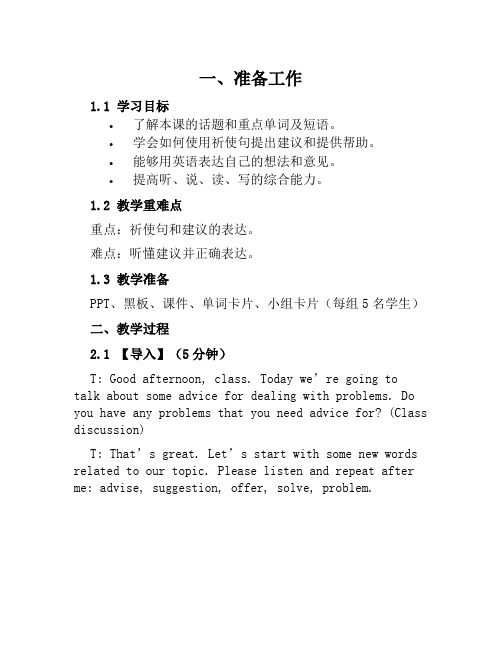
一、准备工作1.1 学习目标•了解本课的话题和重点单词及短语。
•学会如何使用祈使句提出建议和提供帮助。
•能够用英语表达自己的想法和意见。
•提高听、说、读、写的综合能力。
1.2 教学重难点重点:祈使句和建议的表达。
难点:听懂建议并正确表达。
1.3 教学准备PPT、黑板、课件、单词卡片、小组卡片(每组5名学生)二、教学过程2.1 【导入】(5分钟)T: Good afternoon, class. Today we’re going totalk about some advice for dealing with problems. Do you have any problems that you need advice for? (Class discussion)T: That’s great. Let’s start with some new words related to our topic. Please listen and repeat after me: advise, suggestion, offer, solve, problem.2.2 【新课学习】(35分钟)2.2.1 阅读(15分钟)T: Now let’s read a passage about some problems and the advice given to solve them. Please read it silently and try to understand the mn idea.(教师将文章呈现在黑板或PPT上,学生阅读完毕后, T会提出几个问题)1.What’s the mn idea of the passage?2.What advice was given for each problem?3.What problem do you think is the most serious?2.2.2 语言点讲解(10分钟)T: From the passage, we can see that many advice and suggestions were given. What can you use to give advice to others?S1: We can use imperative sentences.T: Yes, we can use imperative sentences. Can anyone give an example?S2: Turn off the lights when you leave.T: Excellent! Here are more examples. (Write the examples on the blackboard.)•Study hard and you’ll get good grades.•Don’t forget to bring your homework to class.•Speak louder, I can’t hear you.T: Imperative sentences can help us give advice or make suggestions. They are usually formed with thebase form of a verb and without a subject. Now, work in prs and get three pieces of advice using imperative sentences.2.2.3 练习 (10分钟)T: Please stand up and sit down when I give you a command.S3: Can I say。
- 1、下载文档前请自行甄别文档内容的完整性,平台不提供额外的编辑、内容补充、找答案等附加服务。
- 2、"仅部分预览"的文档,不可在线预览部分如存在完整性等问题,可反馈申请退款(可完整预览的文档不适用该条件!)。
- 3、如文档侵犯您的权益,请联系客服反馈,我们会尽快为您处理(人工客服工作时间:9:00-18:30)。
Unit2WhatshouldIdo?教案教学设计(新目标版英语八年级)单元教材分析学会should ,Why don’t you和 could在英语中的习惯用法。
使用这些习惯用法,就自己生活、学习中存在的某些实际问题提出建议;拒绝、接受别人的建议。
在学习贴近学生生活实际的语言知识的同时,特别关注学生生活和学习中的真实困难和烦恼。
进一步引导学生对自我和周围世界进行比较客观的认识、评价,发展学生主动解决问题的自我意识和行为能力。
发展学生与人和谐交往的能力;培养在学生交流中寻求帮助。
既坚持自己观点、又听取别人建议。
单元目标1知识目标:学会使用情态动词should、could,学习并使用新单词1. The students will learn to talk about problems.2. The students can help people in trouble and how to give advice.3. Practice the sentences with “could, couldn’t, shouldn’t”.3. To learn the words and expressions about reading passage.2能力目标:(1)能够谈论自己的麻烦和问题。
(2)能够为他人的问题找到合理的解决办法,提出相应的建议。
(3)能够从他人的建议中为自己的问题找到解决办法。
3情感目标:通过共同探讨、解决各种烦恼和困惑,学会反思自己,体谅他人,树立合作精神,培养积极乐观的情感态度。
单元重难点一览重点难点1.词汇:serious, stereo, loud, argue, could, argument, either, bake, teen, family, tutor, original, trendy, haircut, caller, except, upset, lose, aunty, fight2.词汇: out of style, keep out, call up, pay for, ask for, the same as, at school, leave out, get on well with, look for, want sb to do sth, argue with, write sb a letter, a ticket to a ball game, have a bake sale, get a tutor, find out, invite sb to d o sth, leave… at home, be angry with, give sb some advice3.句型:What’s wrong?My parents want me to stay at home every night.My brother plays his stereo too loud.What should I do?Why don’t you talk to him about it?You could give him a ticket to a ball game.I think you should ask your parents for some money.My friend wears the same clothes and has the same haircut as I do.1.语法:could, should的用法。
2.句型:Why don’t you…?3. I don’t know what to do.单元学情分析本单元学会should ,Why don’t you和 could在英语中的习惯用法,在学习贴近学生生活实际的语言知识的同时,特别关注学生生活和学习中的真实困难和烦恼。
进一步引导学生对自我和周围世界进行比较客观的认识、评价,既坚持自己观点、又听取别人建议。
单元教学建议1 采用调查总结学生课后活动来引入新课,让学生自己说进一步体会should ,Why don’t you和 could在英语中的习惯用法,2 阅读文章,了解大意,培养阅读技能。
单元课时分配;7课时教学准备:1,老师准备:设计课件,便条2,学生准备:想想如何来解决面对的问题,如何回复主人公出现的问题第七课时学习目标:A. 词汇及短语until, fit, as much as possible, pressure, complain, include, pushy, send, all kinds of, compare, crazy, adult, on the one hand, …organized, on the other hand,…B. 结构与句型:What should you do to relax?Parents should learn to give their kids a bit more time to themselves.教学难点: 阅读文章,了解大意,培养阅读技能。
教学方法: 在任务的驱动下进行自主阅读教学步骤(学生提预习前习,找出新单词和不懂的句子)step 1 .Read the instructions.1. Encourage the students to think about life outside school hours. List them on the Bb.2. Ask the students to use the list on the Bb to complete the two boxes labeled ‘I do’, and ‘I don’t do-‘. They are free to add any ore activities they do, or don’t currently.3. Ask a few students to share what they have written.step 2.Teach the studentst to learn new words1. Explain that a dictionary can help students learn independently.They can learn new words, how to pronounce them, and how to use them correctly.2. Have a brief memory quiz on all the words.3. Discuss the points made in the Reading Strategy about using a bilingual ,learner’s and electronic dictionary.step 3. While You Reading(小组朗读比赛)Task 1. Ask the students to read and notice the new words.Let the students read the sentences according to the tape Task2.Ask the students to read the passage loudly in groups.step 4 Read ,answer and discuss(分小组,先抽签,小组讨论)1 Why are the children under too much pressure2. What is the life for Cathy Taylor’s three kids like?3. How do the children like them feel?4. Why do the parents push their children so hard5 Is it good for the kids , if the parents try to plan their kids’ lives for them? Why?6. What should the parents do?step 5 Questions(看课件)1. When do you feel under pressure?2. What should you do to relax?step 6 key pointsstep 7 reading againHomework1.Review the vocabulary and target language.2.Write your own conversations about problems and advice.本课总结:如何自主学习,解决问题,关注学习中的真实困难和烦恼板书设计Maybe you should learn to relax1 Football compare complain organized pressure pushy freedom2 find it + adj. to do sth. 发现做某事…find it difficult to plan things for themselvesIt’s time for sth. = It’s time to do sthIt’s time for class. = It’s time to have a classas …as possible 尽某人可能地…= as … as sb. can/couldYou should run as fast as possible (you can教学反思与探讨要让学生大胆阅读,克服语言障碍,以后多想想用什么方式让学生对英语感兴趣。
